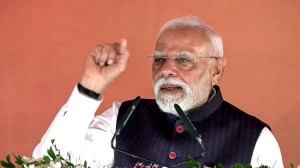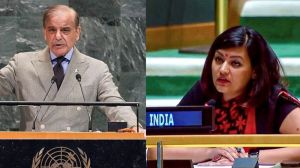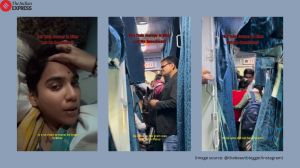Theatre Ke Anokhe Dubey
Till recently,a regular evening at Mumbais Prithvi Theatre meant the rush to make it to the auditorium before the third bell,theatrewallas in separate corners writing furiously in their lined notebooks while veteran actor Suhas Joshi,fondly called Guruji,played the flute under the banyan tree.
A new book explores the many facets of Satyadev Dubey,known for his unconventional choices and connection with languages
Till recently,a regular evening at Mumbais Prithvi Theatre meant the rush to make it to the auditorium before the third bell,theatrewallas in separate corners writing furiously in their lined notebooks while veteran actor Suhas Joshi,fondly called Guruji,played the flute under the banyan tree. Amidst all this,one would often find an ageing man,in a slightly oversized shirt,with his spectacles hanging around his neck,talking passionately to a group of young as well as experienced theatre practitioners,while sipping sulemani chai. That man was Pandit Satyadev Dubey,who after being an actor,director and playwright for decades devoted his time to mentoring others. He was almost a permanent fixture at the theatre,till his health started failing a couple of years ago.
On September 20,when he suffered a seizure,he was at the Prithvi Café. The 75-year-old slipped into coma and was moved to a nursing home. A notice at the theatre,asking for volunteers to spend three-four hours with Dubey,received an overwhelming stream of volunteers and well-wishers. The request was withdrawn soon and two hospital ward boys were appointed to look after him,and to keep the crowds at bay.
His hospitalisation almost coincided with the release of Satyadev Dubey: A Fifty-Year Journey Through Theatres release. The book,the first of a three-part series on modern Indian theatre planned by Natarang Pratishthan,Delhi,and published by Niyogi Books (Rs 495),was released earlier this month. In his foreword,series editor Ashok Vajpeyi introduces Dubey as a stalwart of Indian theatre at a time when modern urban theatre was in the process of establishing itself. He says of Dubey,He is known for his unconventional choices,bold handling of material and a close connection with the language he works in. Vajpeyi also has books on Badal Sircar and Kavalam Narayana Panicker in the pipeline as a part of the series.
Dubey,who was born in Bilaspur on March 19,1936,came to Mumbai in 1952 to do his graduation in English and Hindi from St Xaviers College and to play cricket. He was even selected for the college team,but realising that he wasnt exceptional at the sport,he gave it up. At college,he met filmmaker Vijay Anand,then an amateur theatreperson,who introduced Dubey to this medium. This was a time when traditional theatre in India was fading out along with socially-committed theatre,while modern theatre stood in the wings. In an interview when he won the Sangeet Natak Akademi Award in 1972,Dubey said his early productions were pitted against the tyranny of English theatre. He made it his mission to annihilate the bogus glamour of the English theatre. This,he considered the biggest achievement of Indian theatre of the Sixties.
What helped him achieve it was his uncanny ability to pick unusual plays and to look beyond the obvious. The two plays that are considered to have played a significant role in Dubeys career are the late Dharamvir Bharatis Andha Yug and Sircars Evam Indrajit. In 1956,he discovered Andha Yug,which had been written as a radio play. He saw strong theatrical possibilities in it. He held on to the conviction even though many,including Bharati himself,opposed it. Dubey sent the script to Ebrahim Alkazi,who had just taken over as director of the National School of Drama. Alkazi mounted the play at the ruins of Purana Quila. Six years later,Dubey too staged Andha Yug. Eventually,the play became a classic of post-Independence Indian theatre. Later,Bharati,like many others,credited Dubey for a new way of looking at plays and theatre that gradually spread through the Hindi-speaking world.
As Dubey got more obsessed with theatre,he formed some lasting bonds with Indias greatest theatre personalities,like Amrish Puri,Girish Karnad,Shreeram Lagoo,Sunil Shanbag,Naseeruddin Shah and Akash Khurana. This despite Dubey often being described as quarrelsome,whimsical and temperamental. On the eve of the opening of Jean Anouilhs Antigone,three years ago,Shah said,Dubeyji wanted to do this play. And who could say no to him?
In 2008,Prithvi Theatre dedicated its annual festival to him. The festival was called Theatre Ke Anokhe Dubey (Theatres Unique,Dubey). Earlier this year,he was also awarded the Padma Bhusan.
Shanta Gokhale,editor of Satyadev Dubey: A Fifty-Year Journey Through Theatre,believes that Dubeys most important contribution to theatre was bringing the theatre of Hindi,Kannada,Bengali and Marathi together. He did plays by the big five of the times,Badal Sircar,Mohan Rakesh,Vijay Tendulkar,Adya Rangacharya and Girish Karnad. He was responsible for spreading the word about good plays amongst his colleagues, says Gokhale.
According to her,Dubey believes in the power of the spoken word. He always laid great stress on speech while training actors. He loves language because he loves literature,particularly poetry. But the language of drama is not the language of literature. There are references in the book that tell us about the inordinate patience he showed in getting certain playwrights to turn the language of their plays into something that would have life on the stage, says Gokhale.
Dubeys five-decade journey in theatre is dotted with struggle for funds. He stressed on the importance of money for anyone involved with amateur theatre. Yet,after some years he refused to seek grants from government institutions,as he found running around to fill forms a waste of time. He also had several run-ins with the censors. In 1972,he refused to edit out 150 cuss words from Tendulkars Gidhade as suggested by the Censor Board. Along with Lagoo,he decided to face the consequence of staging it. After a series of summons and meetings with the board,they staged it with three cuts.
Episodes like this,narrated in the book,make it an interesting read,without it becoming too academic. Most of the material is from pieces written by Dubey,his theatre associates,interviews and reviews. Since most of these were in Marathi and Hindi Dubey worked extensively in both the languages Gokhale spent three months translating them after culling out what she needed for the book. To create a cohesive narrative,she arranged the material chronologically. The material fell almost naturally into five decades of work. The Sixties were the Bhulabhai Desai Memorial Institute decade (where he staged plays at a clean space on Mumbais Warden Road). The Seventies the Walchand Terrace (Dubeys house,which doubled as a theatre space) decade,the Eighties the Chhabildas (another Mumbai performance space) decade. The Nineties and beyond are the Prithvi Theatre decade, says Gokhale,who has known Dubey since 1962.
Dubeys self-deprecatory humour has remained undiminished for five decades. This is evident in the last play he wrote and directed,Khuda Ke Liye Mat Dekhna,in 2008. Like all his plays,this too was autobiographical and self-analytical. Dubey called this his last play. Yet,he couldnt stop himself when his friend Karnad came up with Wedding Album. Dubey not only directed its Marathi version,Sapadlelya Athawani in 2009,but also altered certain parts of it. Before Dubey was hospitalised,he was working on improvising a script. Maybe for the sake of theatre,he will once more take centrestage.





- 01
- 02
- 03
- 04
- 05


























